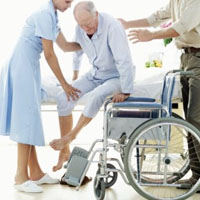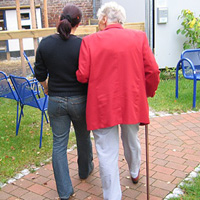A Caregiver’s Guide To Coping With Stress
Caring for the elderly, whether complete strangers or those related to you, can be extremely rewarding. The sense of satisfaction can be immense. However, the down side of caring is that it can be extremely frustrating and upsetting for all parties concerned, especially for the carer. Until you have actually been through it yourself you can never fully appreciate exactly how stressful it can be. It can bring out every possible negative emotion in you that you could ever think of and put you on the fast track to burnout. It is a full time occupation because you will find that it is all you ever think about, even when you are elsewhere. Therefore, it is extremely important to learn how to recognise the signs of stress and how to cope with it early on.
Caregivers can experience extreme stress over the course of their time as a carer for an elderly relative. The most upsetting thing is perhaps getting to know a person really well and then have him or her turn around and not recognise you anymore. It can be heartbreaking, but this may well happen to you. This is obviously an extreme example, but it can cause major stress on your part. There are other causes of stress when caring for the elderly as well. The list can include, but is not limited to, non-compliance with requests, violence, threatening or unreasonable behaviour, illness, confusion and then of course there is the amount of work that you will need to do in order to care for another individual on a full time basis. Even if you are not with that elderly person 24 hours a day, it is still hard to get away from the role. You will find that you constantly think about it and cannot switch off. It may even become the focus of your life until you learn how to deal with it.
It is important to recognise the symptoms. You may find that you are unable to eat, eat too much or suffer from a lack of sleep, even when you are extremely tired. You may become depressed and moody, or find yourself bursting into tear for no apparent reason other than you feel like it. You will almost certainly feel like you are running on empty but keep going even though you feel like you have no energy left at all. This will result in lethargy and snapping at those closest to you. Your frustrations may even be directed at the person you are caring for at the time. You will also find that you will see less of your friends and family because you don’t have time to make the effort any more. In short, your life will revolve around the elderly person you care for but your moods will swing like a pendulum. When you get to that stage, it is time to do something about it!
As soon as you recognize that you have some of those symptoms you must start to take care of your own health because, if you are not mentally well, then you are not fully capable of looking after someone else. How you cope with this and solve the problem is up to you because everyone has different needs and different ways of relaxing. Some carers simply take a break. They go on holiday or take some time off and arrange for someone else to be around to relieve them for a bit. By doing this, you will not be worrying constantly and will be able to enjoy your time off. Other may seek advice from a counsellor so that they can discuss their frustrations and get them all out into the open. The reason they choose a professional is because they are paid not to judge. You may also be able to get home help in so that you can have more time to yourself during the day.
There is no way of avoiding the stress that caregivers are put under, but you have to take care of yourself first. That is the golden rule. Everyone needs a break, and caregivers are no different, so make sure that you get some time off before everything becomes too much.






